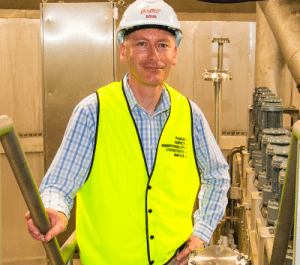ADELAIDE brewer, Coopers, added specialist capacity to Australia’s malt production when it opened its malting plant last week and will supply the malt to its adjacent, brewery, domestic malt buyers and Asian importers.
According to Coopers’ maltings manager, Doug Stewart, quality controls on malt manufactured in Coopers’ new plant will provide value to traditional overseas buyers of Australian malts.
“Our first shipment of export malt is being packed in the first week of January and will go to Thailand,” Dr Stewart said.
“We are looking to export roughly a third of our production to those traditional markets for Australian malts in southeast Asia, such as Thailand and Vietnam, and in north Asia, we are looking to Japan and Korea.
“Beer consumption in some of these countries is still rising, whereas in more mature markets around the world, consumption is declining.”
Versatility a plus
The new Coopers malt house has the capacity to produce 54,000 tonnes of malt per annum, a small quantity compared with others in Australia, global groups, processing two million tonnes.
Dr Stewart said the small size of the Coopers operation puts it in a different market compared with the heavyweights.
“We regard ourselves as brewers of ale, which is a craft beer. For us, craft is a meaningful volume.
“It resonates, I think, that a lot of craft brewers started brewing with a Coopers home brew kit.
“Craft is a market that we are keen to be involved in, so we are prepared to give it a bit more effort by bringing back heritage varieties like Schooner.”
The bin sizes and segregations at the new plant will give Coopers control over malting barley input as well as storage of the bulk malt products.
The plant has about 15 days’ capacity of malting barley input via six bins totalling 3000t, while its bulk malt product storage would accomodate bout 30 days’ production.
“We have gone to a lot of effort to invest in storage to segregate a number of different malt styles for the craft industry,” Dr Stewart said.
“It would give us the ability to have a Schooner pale malt, a Schooner ale malt and a couple of malts from different regions.”
Distiller interest
Australia’s whisky distillers are emerging as a market segment for malt. Some small distilleries in Tasmania and Victoria have been enjoying recognition and growth.
Dr Stewart said Coopers was receiving enquiries from the distilling sector, which would typically require a malt with high diastatic power, similar to the typical malt used by brewers in Asia for whom starch adjunct is part of their beer-making process.
Grain Central: Get our free daily cropping news straight to your inbox – Click here


HAVE YOUR SAY